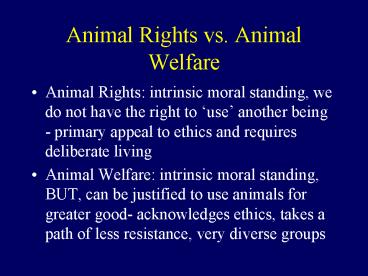Animal Rights vs' Animal Welfare - PowerPoint PPT Presentation
1 / 17
Title:
Animal Rights vs' Animal Welfare
Description:
Animal Rights: intrinsic moral standing, we do not have the right to use' ... Supported by the Humane Society, BLM, Zoos, US Parks Service ... – PowerPoint PPT presentation
Number of Views:523
Avg rating:3.0/5.0
Title: Animal Rights vs' Animal Welfare
1
Animal Rights vs. Animal Welfare
- Animal Rights intrinsic moral standing, we do
not have the right to use another being -
primary appeal to ethics and requires deliberate
living - Animal Welfare intrinsic moral standing, BUT,
can be justified to use animals for greater good-
acknowledges ethics, takes a path of less
resistance, very diverse groups
2
Presumably similar goals
- Perspectives widely scattered within and between
the 2 groups, language and ethics are often
divergent and do not use the same assumptions or
vocabulary - Sometimes opposed to one another, such as issues
involving meat production
3
Immunocontraception
- Birth control developed for overpopulated
wildlife administered by an injection- not
lifelong - Acts by using the immune response of the animal
4
Immunocontraception
- Supported by the Humane Society, BLM, Zoos, US
Parks Service - Prevents need to control by hunting or poisoning
populations that are over-abundant - Opposed by some groups on ethical grounds-
prevents natural life cycle, issue of respect
does not address actual problem, only symptoms
5
IC on Elephants in S. Africa
- Supported by the Humane Society International
- Darted into the animals, on the condition that
they would not be shot or killed intentionally - Later, effects were found to be sterilizing,
sterile animals cannot be removed
6
Animal Welfare
- Humane Society of the United States- not just
pets- wildlife, research use, farmed animals too - The HSUS is dedicated to creating a world where
our relationship with animals is guided by
compassion. We seek a truly humane society in
which animals are respected for their intrinsic
value, and where the human-animal bond is
strong. http//www.hsus.org/ace/11681
7
Animal Welfare
- Animal welfare theories accept that animals have
interests but allow these interests to be traded
away as long as there are some human benefits
that are thought to justify that sacrifice- peta - The animal welfare philosophy endorses the
responsible use of animals to satisfy certain
human needs. fur commission usa
8
Animal Welfare on the UW campus
- IACUC- Institutional Animal care and Use
Committee, USDA Animal Welfare Act - ALL experiments concerning use of live vertebrate
animals must go through a process of explanation
and complete a training course - Board includes a member of PETA, some laypersons
and professionals
9
Animal Welfare on the UW campus
- Medical researchers, wildlife biologists,
psychologists using animals all must take the
basic training - Specialized fields also take more specialzed
training, this is true for specific procedures as
well - All facilities are subject to bi-annual
inspection by USDA
10
Improvements have come!
- Three Rs- Replace
- - Reduce
- -Refine (Russell Burch, 1985)
- These have become almost universally employed
11
Animal Welfare and Wildlife
- International Fund for Animal Welfare
- Founded to stop the Canada seal hunt, recently
announced to be 350,000 seals over the next three
years - Thought to compete for cod, blamed in part for
the lagging cod fisheries in the North Atlantic
12
Animal Rights
- People for the Ethical Treatment of Animals, or
PETA - Membership of 750,000
- Animals are not ours to eat, wear, experiment
on, or use for entertainment. www.peta.org
13
Anti-Animal Rights groups
- AnimalRights.net Debunking the animal rights
movement - Center for Consumer FreedomWe will provide a
cohesive campaign to articulate the case for
economic liberty in some of the most regulated
industries in America. - Fur Commission Farmed fur is a natural fiber and
an environment-friendly resource - Seriously Ill for Medical Research, Andrew Blake
14
Wildlife and Animal RightsHunting- food for
thought
- Is it better to hunt animals, like deer and elk
for food and leather, etc.? OR - Is it better to farm animals domesticated for the
purpose of using their bodies for human needs?
15
Conservation Ethics Where do you stand ???
Anthropogenic Ethic Ethical duties only to other
humans
Ecocentric Ethic Ethical duties to ecosystems
Me
Biocentric Ethic Non-human animals have
intrinsic moral standards
16
What about abroad?
- In Haiti, sub-saharan Africa and some places in
Asia, the rate of AIDS/HIV infection is estimated
at 30 of the adult population, growing
exponentially among women and children under 15 - Worries about animal welfare take a backseat to
stats like that in the eyes of the world
http//www.unaids.org/worldaidsday/2002/press/upda
te/epiupdate2002_en.doc
17
Not as easy in other parts of the world
- Widespread poverty in some countries makes
legislation for animals/ecosystems untenable - More than 70 percent of the poor in developing
countries live in rural areas and depend mostly
on agriculture for their livelihoods.http//www.fa
o.org/english/newsroom/news/2002/8705-en.html































